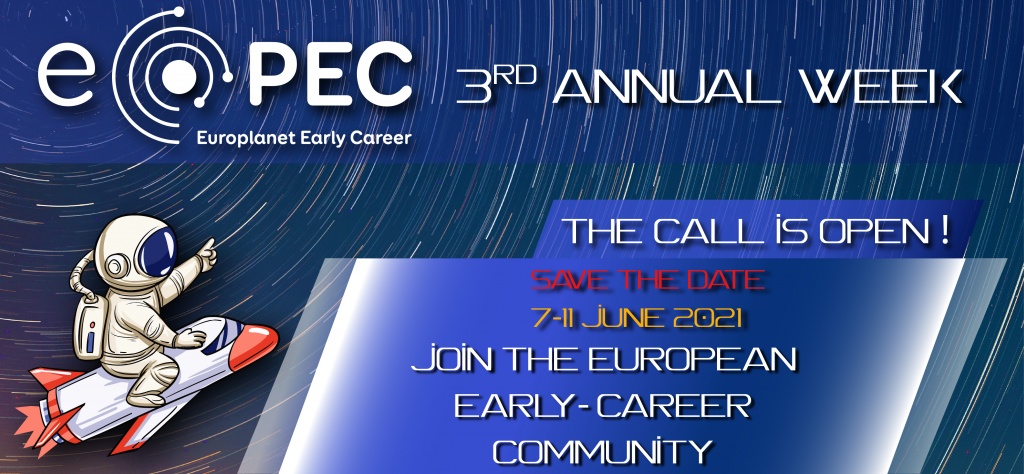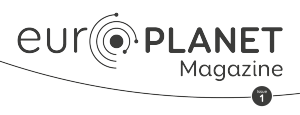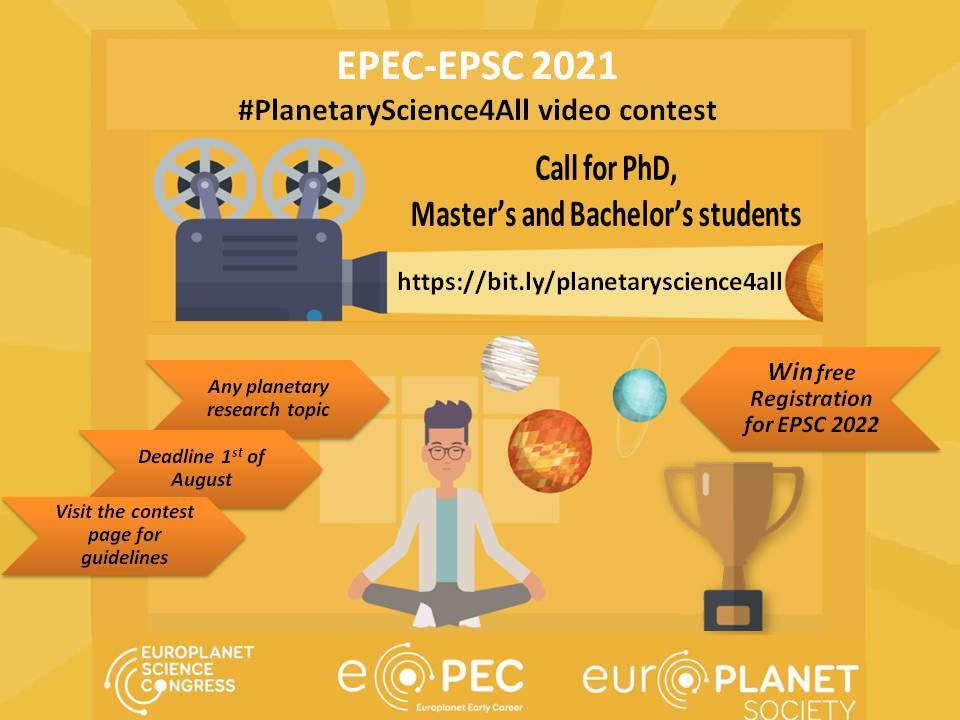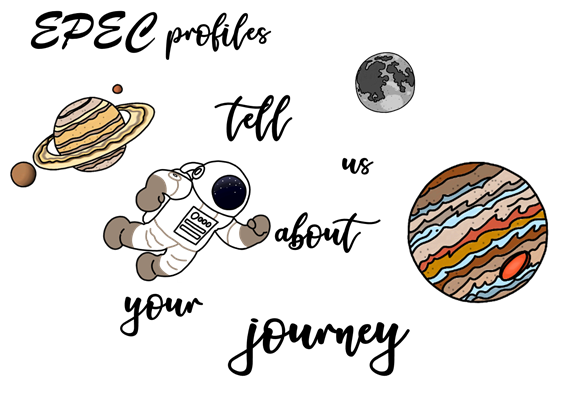
The Europlanet Early Career (EPEC) network is open to all early-career planetary scientists and space professionals whose last degree (e.g. MSc or PhD) was obtained a maximum of 7 years ago (excluding parental leave, serious illness and similar delays).
In this issue, find out how you can join the network, share your profile, take part in the #PlanetaryScience4All video contest and learn what’s happening in the first virtual EPEC Annual Week.
Europlanet Early Career Network: A New Opportunity for Growing together
Read article in the fully formatted PDF of the Europlanet Magazine.
Melissa Mirino (doctoral candidate at The Open University and Chair of the EPEC Communications Working Group) explains how the EPEC network can support early career professionals.
We all know that the space sector offers plenty of career paths, from aerospace engineering to astronomy, and from geology and to astronautics, to name just a few. However, for young professionals, it can be difficult to find a way through this jungle to learn about opportunities that could boost their career prospects (funding, awards, job position etc) or to gain the range of skills they need. In 2014-15, a group of young volunteer professionals decided to address these challenges by creating short courses at the Europlanet Science Congress (EPSC) designed to benefit students or professionals at the beginning of their career journey. Based on the success of these activities, the initial members decided to involve more young scientists and create a permanent early career network within the European planetary community. At EPSC 2017 in Riga, initial members launched the Europlanet Early Career (EPEC) Network and at EPSC 2018 in Berlin, EPEC was offic ally adopted as the early career branch of the new Europlanet Society.
Since then, increasing numbers of people have shown an interest in EPEC, and more and more volunteers have subscribed to our network. Today, hundreds of early career professionals have joined EPEC to share their passion for space and to create something wonderful together. EPEC is committed to building a strong network between young professionals in an enthusiastic and friendly environment. The EPEC network is open to all early-career planetary scientists and space professionals whose last degree (e.g. MSc or PhD) was obtained a maximum of seven years ago.
Currently, EPEC engages in different projects through nine Working Groups. Our activities bring a young voice into the Europlanet Society and help to shape the future of planetary sciences and engineering. Each Working Group enables its members to expand their experience in event and meeting organisation, create new initiatives, develop specific skills and gain team-working and leadership capabilities within an international environment.
There are many ways that an early career professional can join our network:
- Subscribe to our mailing list to be updated about the news in our community
- Become an active member of one or more Working Groups
- Join our Slack channel
- Follow us on our social media pages (Facebook and Twitter)
- Join the EPEC Annual Week
- Check the volunteer vacancies on our website:
All information about each working group and the current activities can be found at: www. europlanet-society.org/early-careers-network/epec-working-groups/

#PlanetaryScience4All: A Video Contest for Virtual Science Communication
Melissa Mirino (doctoral candidate at The Open University and of the Chair EPEC Communications Working Group) shares how the extraordinary experiences of 2020 inspired her to launch a contest to bring together the early career community.
Read article in the fully formatted PDF of the Europlanet Magazine.
The year 2020 will be always remembered as a year of isolation, disruption of the normal daily activities, and in extreme cases a year of loss. However, during this period we all did our best to find alternative solutions to carry on with our lives, jobs and activities and remain positive and connected with each other using the current available technologies. Research and academia have not been an exception. Both the Europlanet Society and the Europlanet Early Career Network (EPEC) did their best to remain active, and guarantee the usual sharing of ideas and scientific results, by transforming the Europlanet Science Congress (EPSC) 2020 into a virtual meeting.
As Chair of the EPEC Communications Working Group, I wanted to create an activity that could combine the EPEC goal of supporting early careers, our working group’s aim of communication, and the need to transform face-to-face activities into a shareable, interactive and online form to support the EPSC2020 virtual meeting. The idea of a video contest came to mind. This format is already considered by many universities as a good way to train and challenge students in science communication. Since the main subject of EPSC is planetary science, the topic of the video contest was easy to identify. With support from the EPSC2020 Outreach and Europlanet Communications teams, and many months of planning, creating and sharing the new activity, the #PlanetaryScience4All video contest became a reality.
#PlanetaryScience4All challenges early career students to present their research in four minutes to a non-expert audience. The first edition (2020) of the contest was open to PhD candidates involved in planetary science studies, asking them to explain their PhD research using any type of creative video format (Lego movies, drawing, PowerPoint, storytelling etc.). The videos were judged based on criteria of scientific content, communication skills and creativity by a panel of experts from the Europlanet Community.
All the contestants and their videos were featured in live sessions during EPSC2020, promoted on YouTube and shared widely on social media. The winning video was highlighted through the Europlanet website and newsletters, and it has also been used for EPEC outreach activities. The winner of the 2020 edition, Grace Richards, received a free registration to this year’s EPSC2021 meeting. Recently, Grace and Gloria Tognon, another contestant, have also joined the EPEC Communications Working Group to support our activities. Based on the success of the 2020 competition, I feel confident that #PlanearyScience4All will become a traditional part of EPSC. The second edition is now open, this year welcoming Bachelor’s and Master’s students, as well as PhD candidates working on a thesis related to planetary science.
More information FAQs, flers and the submission form visit
Videos from the 2020 #PlanetaryScience4All contest
Every month on the Europlanet Society website, we publish the profile of an early career professional working in the planetary or space sector. If you would like an opportunity to be in the spotlight, please submit your story.

3rd EPEC Annual Week
Erica Luzzi, Chair of the EPEC Annual Week Working Group, looks forward to holding the 2021 event as a virtual meeting.
Read article in the fully formatted PDF of the Europlanet Magazine.

The 3rd Europlanet Early Career (EPEC) Annual Week is being held virtually from 7-11 June 2021. Early-career professionals attending the event are taking part in a variety of workshops and seminars focused on helping them to build their future career, with time scheduled for open discussions with speakers. Topics covered in the programme include how to write a good paper, how to look for funding, and how to choose a career-path in industry versus academia. The fundamental core of the EPEC Annual Week event is networking: every early career can be part of the EPEC community, sharing expertise but also contributing to EPEC’s activities. The EPEC Committee oversees multiple Working Groups covering areas such as outreach, diversity, communications, future research and early career support.
The participants of the 3rd EPEC Annual Week will have the chance to become part of one of these Working Groups and brainstorm, network and nourish new ideas. Due to the pandemic, there will be no opportunity to explore a European city, as in past events, but looking on the bright side: with a virtual event there are no limits for the number of participants and EPEC looks forward to reaching its largest audience yet.





